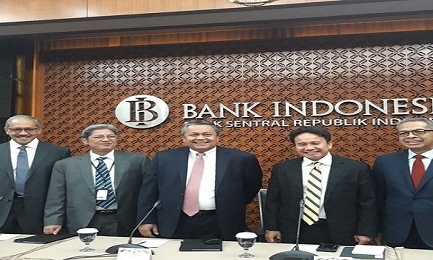 Bank Indonesia lowered BI's benchmark interest rate (Credit : Kompas)
Bank Indonesia lowered BI's benchmark interest rate (Credit : Kompas)
Bank Indonesia decreases BI Reference Interest, what’s the effect?
Bank Indonesia has decided to reduce benchmark BI 7 Days Reverse Repo Rate (BI7DRRR) by 25 bps to 5.75 percent. After since November 2018, it has held interest rates of 6 percent.With the reduction in BI's benchmark interest rate, it will certainly affect deposit rates and lending rates in the foreseeable future, as said by PT Bank Central Asia Tbk (BCA) economist David Sumual.
According to BI Governor, Perry Wardjiyo, lowering of liquidity interest rates in the financial market will increase. As a result, loan interest rates can be reduced and bank deposits will decline, because BI has also lowered the minimum reserve requirement (GWM) of banks by 50 bps to 6 percent for conventional banks and 4.5 percent for Islamic banks that add liquidity to banks up to Rp. 28 trillion.
PT Bank Permata Tbk's VP Economist, Josua Pardede explained that before influencing loan interest rates, this BI rate cut would be responded in advance by the Interbank Money Market (PUAB) interest rate. According to him, the time needed is usually around three months for loan interest rates and one month for deposit rates, depending on the conditions of liquidity and credit risk of each bank.
The decline in BI's benchmark interest rate is expected to contribute to lowering bank lending rates. Because cost of funds of the bank will also decrease along with the interest rate cut by the central bank. The cost of fund itself is the cost needed by the bank to obtain deposits, after previously added with the required reserves determined by the government.
Source: https://money.kompas.com/read/2019/07/19/064400626/penurunan-suku-bunga-acuan-bi-bakal-turunkan-bunga-kredit-bank-kapan-
 English
English Japan
Japan

amoxicillin suspension buy amoxicilina noscript canada amoxicillin and mucinex amoxicillin uti dose
how to raise sexual libido cialis and melanoma risk compra viagra price of viagra at walmart vitamins for women's low libido
priligy uk super avana without prescription buy sildenafil 100mg and dapoxetine 100mg. how long does dapoxetine make you last?
amoxil is for amopisil why eat amoxil with food ok to take amoxil after zantac
ivermectin sensitive dogs buy oral ivermectin for dogs what parasit is resistant to ivermectin
grocery coupons 2017 cheap viagra viagra pills 100 mg flomax side effects in elderly men sildenafil 100mg tablets side effects strongest viagra pill sildenafil 20 mg tablet coupon viagra generic 100mg kroger purified bottled water viagra government funded sildenafil citrate 100mg prices prescription drugs to increase libido natural viagra recipe viagra to cialis dose conversion 5mg cialis vs 100mg viagra google viagra side effects viagra pfizer generic tadalafil india medications that cause increased libido does extenze male enhancement work how to use cialis 20mg viagra jokes does walgreens price match sildenafil 50mg tablets prices viagra and cocaine mix levitra vs viagra purchasing cialis on the internet viagra from china does medicare pay for viagra or cialis what does viagra do teva generic viagra in usa
modafinil vs phenylpiracetam tricare standard mail order pharmacy provigil doctors in chicago who prescribe modafinil
amoxil pediatric dosage amoxicillin 875 125 mg tab difference between augmentin and amoxil why is my face red after amoxil
azithromycin tablets azithromycin 500mg lowest price online zithromax allergic reaction in children azithromycin when to take
amoxil for toothache amoxicillin for sinus infection amoxil para barba efectos secundarios amoxicillin uses
neurontin lawsuit neurontin 800 pill price of amitriptyline vs neurontin how long does gabapentin take to work in dogs
plaquenil stock symbol plaquenil 200mg cost how can plaquenil help sjogren's what is plaquenil opiate
cost of viagra 100mg walmart otc samples for physicians buy viagra cheap generic insurance company cialis 5 mg tablets cost
furosemide tablet 40mg furosemide 3169 what are lasix tablets used for administering furosemide too quickly can result in which condition?
viagra patent expiration date extended large penile implant photos best herbal male enhancement pills online viagra cheap effects of cialis and marijuana best natural erectile dysfunction pills pulmonary hypertension in dogs
furosemide high lasix medicine price lasix side effects mayo clinic how furosemide affects cholesterol
naproxen and neurontin neurontin medication neurontin vs lyrica for nerve pain what is gabapentin used to treat?
600 mg neurontin gabapentin cost canada neurontin dose for diabetic neuropathy gabapentin how long does it last
provigil from india buying provigil from an indian pharmacy can modafinil make me talkative how long for modafinil to kick in